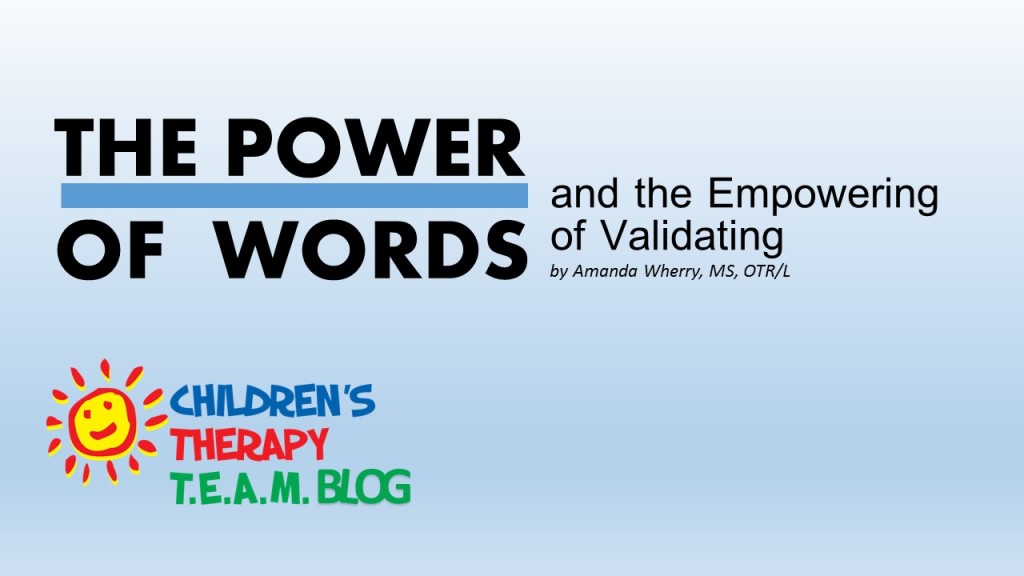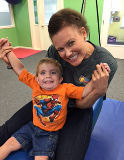
During my first year working at the hospital in Central Asia, before there was a pediatric therapy department, I began seeing more and more children brought in from the countryside. The rumors had spread throughout surrounding villages and even surrounding provinces that a “foreign expert” was now available to see kids. Therefore, a growing tide of families began bringing their toddlers, elementary age, and teenage children to me. They all had one request, “Fix them.” The vast majority of the children had moderate to severe cerebral palsy. They had never received what I would term “active therapy.” But several families had spent their life savings on the falsely advertised, “brain-fixing” IV fluids that were making many a millionaire throughout the mainland. When these IVs did nothing other than make children terrified of any human wearing a medical white coat, families became just desperate enough to be willing to try therapy – a concept they generally knew little to nothing about. At least some families became willing. Others still believed that there was a mystical and immediate cure out there for CP.
It was rarely due to lack of love that parents became abusive toward their children. But lack of education and misunderstanding go a long way in creating an environment full of frustration, an environment ripe for opportunity to vent those frustrations on your one and only offspring. With certain Asian laws still actively enforced where I lived, having a child with special needs not only sealed the child’s fate in an overpopulated, madly competitive society, but it also sealed the fates of parents that would one day age into needing assistance – assistance that generally fell solely on the shoulders of that one and only precious baby. I saw fear drive parents into doing and saying things that years before they probably assumed was not possible for them.
One such moment was when a young father brought in his 4, nearly 5 year-old little boy. This son was one of those children who glow with such effervescence that I found myself completely unable to keep myself from scooping him up and wanting to snuggle him incessantly. He had beautiful, giant brown eyes, a smile that enveloped the majority of his face, and just a hint of mirth glinting off of him that made him impossible not to love. He had been born in a village hospital, and due to lack of oxygen at birth, had developed the symptoms of cerebral palsy. His lower extremities were tight with high tone, and although he was able to walk a few unsteady steps by obtrusively swinging his hips, he preferred to mobilize around the treatment room by scooting on his booty – a sight that caused his father obvious embarrassment. His dad looked at me, and right in front of his son, said, “My son can’t walk. He doesn’t even try. He is stupid and lazy. If he would try harder he could walk like other children. Make him walk.” And right at that moment, the boy, who had been attempting some steps (upon his father’s command), lost his balance and fell against his father’s legs – to which the father smacked his son hard enough to send him sprawling to the floor and told him to get off and “walk right.” The sound of that slap filled the bare-walled and tiled floor of the room to such a degree that I couldn’t control my own gasp that completed the echo. I stooped, scooped up that precious child, told the father with my words, “Please wait one minute,” (though I’m pretty sure my eyes told him something less polite) and swept the boy into the hallway while he sobbed into my shoulder.
I asked the boy if he was OK, as I could easily see a red welt forming across his cheek. But he was fine, physically. He was from a minority group that is known for being physically tough. They live in harsh conditions, and over the years I saw patient after patient come to the hospital with horrific injuries yet having not shed one tear in pain. But, as “fine” as the boy was physically from the slap, he was just as “not fine” emotionally. He was ashamed. Embarassed. And overwhelmed by feelings of having once again disappointed his father. These are unforgivable sins in the culture of central Asia, and he and I both knew it. All I could do was to speak words of life over that little boy – and so I told him how precious he was, how his life had meaning and worth, how he was smart, and fun, and funny, and was so, so lovable. He stopped crying, reached up with both hands to squish my cheeks, and twinkled a hint of a smile at me. I took him back to his father, told the father that there was no such thing as a total “cure” for CP, and gave him the run-down for a therapy treatment plan. And with that, the father roughly picked up his son and walked out of the room – while the little boy looked over his father’s shoulder and locked eyes with mine until they exited the doorway, turned the corner, and were out of sight. The father never brought the boy back again.
There is something deeply powerful in words. The second half of Ephesians 4:29 says, “. . . Let everything you say be good and helpful, so that your words will be an encouragement to those who hear them” (New Living Translation). Good and helpful. Those two words alone are beneficial to remember. Yes, the power of words has a deep impact.
I don’t think that man was a horrible father, and I don’t think that he was trying to horrifically shame his son. I think he was trying, in the only way he knew how, to motivate his son to walk, to fit in, to be like others so that he had at least a chance to make it in an unforgiving society that places value strictly on performance and not on person. But he was blind to the way that he was disabling his son even more by speaking words that cripple the soul and either create or deepen spaces for crushing insecurities. Such insecurities can keep a person blocked emotionally, socially, and relationally for decades or a lifetime.
Brené Brown, a researcher on shame and vulnerability, calls shame “the swampland of the soul.” In her research, she has discovered that shame has two big lies.
- The “Never Good Enough” lie
- The “Who Do You Think You Are?” lie
The kids who we, as therapists, work with face these lies every day. They already stand out as different. They use a wheel chair, walk with crutches, look different, sound different, think different and need to go to therapy because they are different. They get compared to national “norms,” the results of their evaluations get placed on a bell curve or termed “typical” vs. “probable difference” vs. “definite difference.” It doesn’t take a stretch of the imagination to see how children with special needs, with developmental delays, or with anything that would place them in a therapy setting, could make them feel “less than.” And so it is our job as therapists to confront and counteract the lies that these children may believe. Because they are good enough. They are valuable. They are important. Just as they are.
But what about us adults? It’s hard to speak what you yourself haven’t recognized or don’t believe.
What are our triggers that make us feel “less than?” If we don’t press into these difficult emotional areas, then it’s nearly impossible for us to recognize, validate, and honor the emotions or struggles the children we work with or live with might be going through. What are the things that rub an emotionally vulnerable spot and cause us to react rather than respond? What incident or wound has been left dormant and unaddressed (because not addressing wounds “feels” safer) but has brought about the secondary effect of us becoming the “shamers” because we were once shamed.
Like I said, I don’t think the father I met at the hospital was a bad father. But he was embarrassed by his son’s lack of ability. He was fearful about the future, and he probably felt like a failure because he couldn’t control what was going on. Knowing what the culture is like there, he was also probably being told on a daily basis what he was doing wrong, what he should have been doing for his son, and how “everyone else” would have and could have done things better or differently. He was being shamed by both himself and others constantly. And since an emotion like shame hits our amygdala (the emotion-behavior center of our brain) with such force that we typically either flee or charge through like a train off its tracks, the behavioral results were less than ideal.
Shame is sneaky. Sometimes it’s something as simple and seemingly inconsequential as, if after having just given your child instructions on the next activity, he or she looks up at you and says, “What am I supposed to do?” – is your response along the lines of, “What did I just tell you?” (Shaming) or is it more along the lines of, “Let’s think about this together, really hard, and I bet you can remember.” (Empowering and Reassuring).
Or maybe your client is having quite the day of emotional overreactions and you snap at them – not because snapping at them will be beneficial to helping them calm and self-soothe, but because you glanced up and saw your co-worker roll her eyes and raise her eyebrows at your alleged inability to “get your client under control.” You felt shame – and that shame touched some deep place inside of you that wants to be known as a capable, talented, valuable individual. You felt disapproved of, you felt a lack of control, you felt “less than” – and your client faced the result of your emotions.
And so, what if, as we work together to create an environment of health and healing for the children we work with and/or live with, we also create an environment where shame has no space to reside? This takes a lot of inner work – because we can only change what we are aware of, and we so rarely allow ourselves to be aware of what is emotionally hard or painful. But the end result (not that I’ve reached the end result of my own journey…) is worth the process.

 Amanda Wherry is a local and international advocate for individuals and families with disabilities. She spent nearly 7 years in a remote area in inland Asia developing a hospital pediatric therapy program with teaching in physical, occupational and speech therapy as well as NICU therapy. read more
Amanda Wherry is a local and international advocate for individuals and families with disabilities. She spent nearly 7 years in a remote area in inland Asia developing a hospital pediatric therapy program with teaching in physical, occupational and speech therapy as well as NICU therapy. read more

